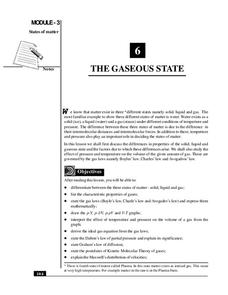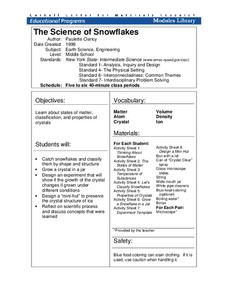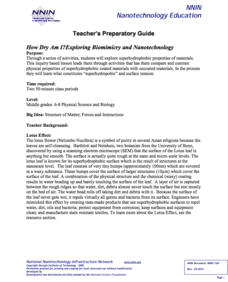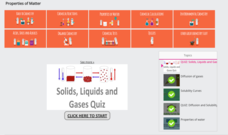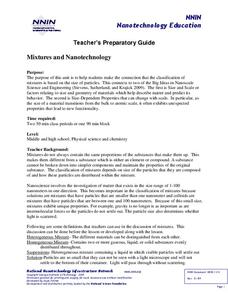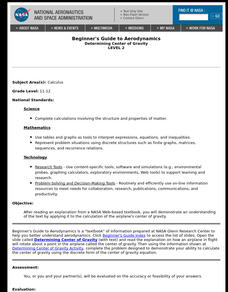National Institute of Open Schooling
The Gaseous State
Sixth in a series of 36, this lesson focuses on gases and their behavior in given situations. Learners review the states of matter and then focus on gases, specifically learning Boyle's, Charles's, Avogadro's Laws, Dalton's, and Graham's...
Cornell University
The Science of Snowflakes
Who can grow the best crystals? Challenge class members to develop strategies for enhancing growth in the crystals. Through a lab investigation, learners study the properties of crystals and test the effectiveness of different...
National Nanotechnology Infrastructure Network
How Dry am I? Exploring Biomimicry and Nanotechnology
Help your classes feel like they can walk on water! An engaging inquiry-based lesson has young scholars experiment with different surface coatings. They make observations about their properties and how they relate to the surface tension...
Fuse School
Quiz: Solids, Liquids and Gases
Time to show what they know! Module five in a 14-part series about solids, liquids, and gases redirects to an interactive quiz. Learners test their skills on topics such as states of matter, phase changes, and Brownian Motion. With...
National Nanotechnology Infrastructure Network
Mixtures and Nanotechnology
What does size have to do with it? Learners analyze different mixtures, both homogeneous and heterogeneous, to discover the properties related to the size of their particles. The activity connects these properties to those of...
Cornell University
Glued into Science—Classifying Polymers
Explore the unique characteristics of polymers. A complete lesson begins with a presentation introducing polymers. Following the presentation, young scientists develop a laboratory plan for creating substances using polymers. They...
National Nanotechnology Infrastructure Network
Synthesis and Characterization of CdSe Quantum Dots
Does the size of a sample change the physical properties of that substance? It turns out it can! Young scientists combine physics and chemistry to synthesize CdSe quantum dots and record their color properties. Learners should...
Pingry School
Qualitative Analysis of Eleven Household Chemicals
Chemical and physical properties give compounds an identity. Learners use the identity of a compound to predict what it is. By performing different tests like solubility, flame, heat, and reactions, individuals attempt to identify an...
Curated OER
Absorbancy: What does it mean?
Define the scientific concept of absorbency as it relates to the properties of matter, then conduct an investigation. Learners answer several questions, then investigate the absorbency of several different types of towels. Tip:...
EngageNY
Least Common Multiple and Greatest Common Factor
Find the common denominator between prime factors, factor trees, and the distributive property. Scholars learn to find the least common multiple and greatest common factor of pairs of numbers. They rotate through stations to connect...
Agency for Toxic Substances and Disease Registry
Don't Mess with Mercury (Lesson C)
The health effects of mercury exposure if the focus of the first of three activities about the properties of metals. Pairs research mercury to write, prepare, and share posters, articles, or PSAs with the class.
Curated OER
Is it Permeable?
The question is posed, is it permeable or impermeable, it's up to your critical thinkers to determine the answer. This presentation provides several scientific concepts related to permeability and the properties of matter alongside...
Curated OER
Chapter 3 Worksheet Matter
In this matter worksheet, students answer ten questions about matter including the phase of matter, mixtures and how they are different from compounds, the physical and chemical properties of matter and the difference between homogeneous...
Curated OER
States of Matter
Fourth graders define the term matter. They compare properties of solids, liquids, and gases. They describe how matter changes from one state to another. They classify objects as either solid, liquid, or gas.
Curated OER
Properties of Materials - Part B
Students describe the history of materials. They use the kinetic (particle) theory to explain changes of state in matter and trace the flow of heat during changes of state and chemical changes.
Curated OER
States of Matter
In this states of matter worksheet, students read about the changes in energy for matter to go from one state to another state. They complete a chart for each state of matter and identify the shape, the volume, its compressibility, the...
Curated OER
Classification of Matter
In this classification of matter worksheet, students answer 5 questions about the composition of matter, solutions, colloids and suspensions, and the properties and changes of matter.
Curated OER
States of Matter
In this matter activity, students read a chart that uses water to show the three most common states of matter. Students review the properties of solids. This activity has 2 graphic organizers and 8 fill in the blank questions.
Curated OER
Science: Changes in Matter
Second graders discover what changes occur in various types of matter under different conditions. They make predictions about the changes in an apple left out in the air, water placed in a freezer, and a nail left in a cup of water. They...
Curated OER
Funny Putty, Serious Stuff
Students make putty and explore its properties. For this colloids lesson, students identify the properties of solids, liquids, and gases. Then, they create a collide and examine its unique properties.
Creative Chemistry
States of Matter Summary
For this states of matter worksheet, students are given a summary of the particle arrangement, the motion of particles, the properties of particles, and models of particles in solids, liquids, and gases. Melting, evaporating, boiling,...
Curated OER
Oobleck!
Learners use Oobleck to investigate the properties of colloids. In this Oobleck and colloid lesson, students listen to the beginning of Bartholomew and the Oobleck by Dr. Seuss. They experiment with Oobleck (corn starch, water, and...
Curated OER
Stolen Property or Finders Keepers
Students explore the questionable acquisition of priceless artworks gained as spoils of World War II. They become investigators and reporters looking into the matter of ownership of the world's greatest art.
Curated OER
Determining Center of Gravity
Learners complete calculus calculations involving the structure and properties of matter and determining the center of gravity.
Other popular searches
- Properties of Matter
- Physical Properties of Matter
- Properties of Matter Song
- Useful Properties of Matter
- Science Properties of Matter
- Properties of Matter Booklet
- Properties of Matter Lecture
- Compare Properties of Matter
- Chemical Properties of Matter
- Social Properties of Matter
- Properties of Matter Test
- Intensive Properties Matter
